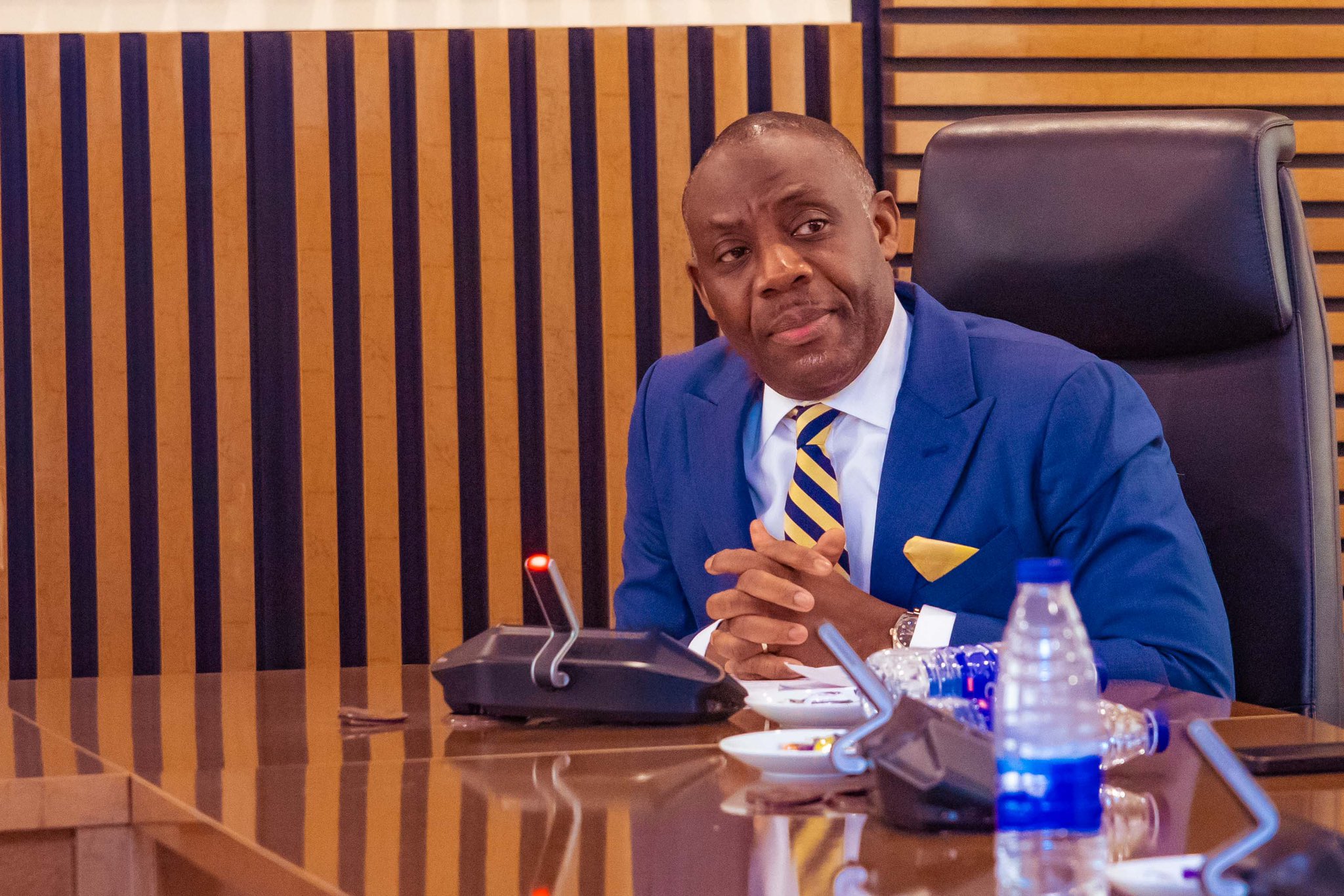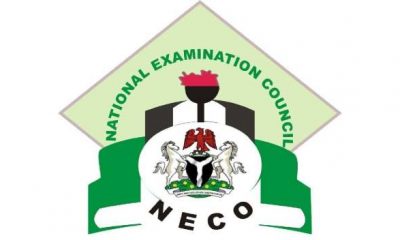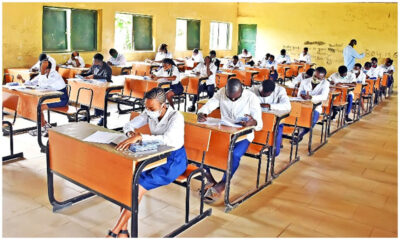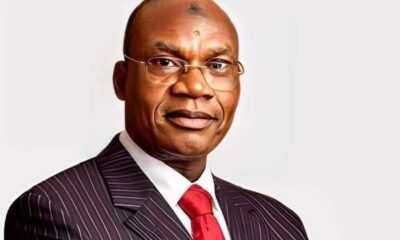Education
NECO releases 2020 external exam results, blacklists four supervisors

The National Examinations Council (NECO) has released the results of the 2020 Senior School Certificate Examination for external candidates.
Registrar/Chief Executive, NECO, Prof. Godswill Obioma, announced the results in Minna, Niger State, on Thursday, adding that a total of 41,459 candidates registered for the examination, out of which 39,503 actually sat.
A total 6,465 malpractice cases were recorded in the exam, which was far below the 17,004 cases recorded in the 2019 exam.
The NECO boss explained further that a total of 26,277 candidates obtained five credits and above including, English Language and Mathematics, while 34,014 candidates also obtained five credits and above irrespective of English Language and Mathematics.
The registrar reiterated the council’s zero tolerance for examination malpractice, noting that appropriate standards and excellence were maintained right from the planning stage to the release of results.
He said, “We recorded 6,465 cases of examination malpractice in the 2020 SSCE External as against 17,004 cases in 2019,” he said.
He noted that the reduction in the level of malpractice was as a result of close monitoring of the examination by members of the governing board, management and senior staff of the council.
He said that in line with the council’s zero tolerance for examination malpractice, four supervisors who were found culpable of aiding and abetting malpractice had been blacklisted.
One examination centre in Ogun State has been de-recognised for intimidation and several attempts to induce NECO officials as well as aiding and abetting examination malpractice.
It was further disclosed that the results of 256,000 candidates who missed some papers during the 2020 SSCE (Internal) due to the #EndSARS protests in some states and who sat for those papers during the 2020 SSCE (External) were released alongside those of external candidates.
He said, “It is gratifying to note that the examination was at no extra cost to the affected candidates.”
Education
12-year-old Nigerian girl Eniola Shokunbi invents air filter to reduce spread of diseases in US schools

12-year-old Nigerian girl Eniola Shokunbi invents air filter to reduce spread of diseases in US schools
A 12-year-old Nigerian from Connecticut, USA, Eniola Shokunbi, has designed an air filter to reduce spread of air borne diseases in the US schools.
The design aims at creating low-cost air filters for classrooms.
The Connecticut State Bond Commission has approved $11.5 million in funding for the design.
Eniola in her fifth grade at Commodore MacDonough STEM Academy of Middletown, they were tasked with creating a solution to enhance safety in schools during potential future pandemics.
Therefore, to combat airborne viruses like COVID-19, she developed a simple but effective air filter system.
Design
Shokunbi’s air filter design showcases both innovation and cost-effectiveness. The unit is constructed using a simple combination of components: a box fan, four furnace filters, duct tape, and cardboard.
READ ALSO:
- Gunmen kill two soldiers in Abia checkpoint attack
- 94 arrested as task force raids Lagos rail corridor squatters
- Two dead, buildings destroyed in American factory explosion
This ingenious assembly results in a remarkably low production cost of approximately $60 per unit. This makes it a highly affordable alternative to commercial air purifiers.
Eniola Shokunbi said, “The air goes through all the sides, and it comes out of the top. So it filters in and out.”
With support from scientists at the University of Connecticut, UConn, Eniola’s design underwent rigorous testing.
The Environmental Protection Agency, EPA, confirmed that the device effectively eliminates over 99% of airborne viruses, showcasing its potential to significantly improve classroom safety.
The recent approval by the State Bond Commission allocates $11.5 million for the implementation of these air filters across Connecticut schools.
This funding is part of UConn’s SAFE-CT: Supplemental Air Filtration for Education Program, which aims to ensure that every public school classroom has access to these vital air purification systems.
Eniola’s vision extends beyond Connecticut; she aspires to see her air filters implemented in classrooms nationwide.
“A lot of people don’t realize that the only thing standing between them and getting sick is science,” Eniola Shokunbi said.
Also, she emphasized the importance of investing in scientific solutions for children’s health.
12-year-old Nigerian girl Eniola Shokunbi invents air filter to reduce spread of diseases in US schools
Education
Minister wants FG to revive Jonathan’s Almajiri system of education

Minister wants FG to revive Jonathan’s Almajiri system of education
Alausa made the call when the Senate Committee on Tertiary Institutions and TETFund led by its Chairman, Sen. Muntari Dandutse, visited the ministry for an oversight function.
Alausa, who was newly posted to the ministry, decried the high rate of out-of-school children, saying that with enough fund allocation, the menace would be tackled.
“We have up to 20 million out-of-school children.
“I met with the Executive Secretary of the National Commission for Almajiri and Out-of-School, who said that the 20 million was even under-quoted.
“It is about 40 million to 50 million. This is a danger that can consume everybody. We have to make these schools work.
“Former President Goodluck Jonathan built about 137 Almajiri schools during his tenure, but today, it is sad that only a few of these schools are operational,” he said.
Alausa said that there was a lot of infrastructural decay in the schools, adding that with the Almajiri Commission established by an act of Parliament, the ministry would empower the children.
READ ALSO:
He, however, called for more funding to achieve the desired goal of ensuring that out-of-school children were taken off the streets.
The minister further said that the ministry would find a way of keeping children in school by making the Home Grown Feeding Programme viable and sustainable.
“We will design the nutrition, we will ensure that the children get good nutrition which will translate into better brain development, and enable us to develop human capital,” he said.
He also said that the nation was churning out graduates that were not employable.
“We have to refocus, and the way we are refocusing is that going forward, we will focus on Science Technology, Engineering, Mathematics and Medical Sciences (STEMM).
“Today, we have hospitals built, infrastructure is there and funded, but we do not have medical personnel to run them.
“We will also focus on technical, and vocational education. We will encourage 80 per cent practical training and 20 per cent theory,” she said.
The Chairman of the Committee, Sen. Muntari Dandutse, said that the Senate would collaborate with the ministry to make education a priority in the country.
Dandutse also called on the minister to give attention to the issues of security and power supply to higher institutions.
“Most of the allocation to the universities is going to the payment of electricity bills. We need to work together to ensure that they have an uninterrupted power supply,” he said.
Minister wants FG to revive Jonathan’s Almajiri system of education
NAN
Education
FG reverses 18-year admission entry for varsities, sets new priorities

FG reverses 18-year admission entry for varsities, sets new priorities
In a significant policy shift, Nigeria’s newly appointed Minister of Education, Dr. Tunji Alausa, has announced the abolition of the 18-year admission benchmark for tertiary institutions across the country.
During his inaugural press conference in Abuja on Wednesday, he also indicated plans to review the nation’s education policy.
Despite these changes, Alausa reaffirmed that there will be no reversal of the Federal Government’s recent decision to invalidate over 22,700 degree certificates obtained by Nigerians from certain “fake” universities in neighboring Togo and the Benin Republic.
This move aims to uphold the integrity of the nation’s education system.
Emphasizing the need for practical education, Alausa noted that the current system cannot continue producing graduates without corresponding job opportunities, which has contributed to Nigeria’s rising unemployment rates.
To address this, he announced plans for the federal government to partner with private sector operators to provide training and development opportunities for students, unlocking their potential for future employment.
Additionally, Alausa expressed a commitment to empowering universities of agriculture to adopt commercial farming practices as a strategic approach to combat food insecurity in the country.
FG reverses 18-year admission entry for varsities, sets new priorities
-

 Sports16 hours ago
Sports16 hours agoBREAKING: Super Eagles qualify for AFCON 2025
-

 Aviation17 hours ago
Aviation17 hours agoDisaster averted as bird strike hits Abuja-Lagos Air Peace flight
-

 Railway3 days ago
Railway3 days agoNigerian railway adds extra train to Friday, Saturday trips on Lagos-Ibadan route
-

 International3 days ago
International3 days agoUK announces 45,000 seasonal worker visas for 2025
-

 Education2 days ago
Education2 days ago12-year-old Nigerian girl Eniola Shokunbi invents air filter to reduce spread of diseases in US schools
-

 Business3 days ago
Business3 days agoTop 5 crypto apps that work with Nigerian Bank accounts
-

 Politics2 days ago
Politics2 days agoWhy I can’t form coalition with Peter Obi – Sowore
-

 News18 hours ago
News18 hours agoEdo Gov Okpebholo freezes govt accounts, reverses ministry’s name














